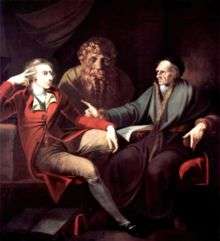Johann Jakob Bodmer

Johann Jakob Bodmer (19 July 1698 – 2 January 1783) was a German-Swiss author, academic, critic and poet.
Life
Born at Greifensee, near Zürich, and first studying theology and then trying a commercial career, he finally found his vocation in letters. In 1725 he was appointed professor of Helvetian history at the Carolinum academy in Zürich, a chair which he held for half a century, and in 1735 became a member of the Cantonal Council. He died at Zürich in 1783.
Works
His major writings are the treatises Von dem Wunderbaren in der Poesie (1740; this and following years link to corresponding "[year] in poetry" articles) and Kritische Betrachtungen über die poetischen Gemählde der Dichter (1741), in which he pleaded for the freedom of the imagination from the restriction imposed upon it by French pseudo-classicism. Bodmer's epics Die Sundflutz and Noah (both 1751) are imitations of Klopstock's Messias, and his plays are entirely deficient in dramatic qualities. He also issued editions of the Minnesingers and part of the Nibelungenlied.
He published (1721–1723), in conjunction with Johann Jakob Breitinger and others, Die Discourse der Mahlern, a weekly journal after the model of The Spectator. In it, German poetry was severely criticised for its servility to French models. Through his prose translation of Milton's Paradise Lost (1732), also, he tried to make English literature accessible in Germany. He formed a German literary school in opposition to Johann Christoph Gottsched of Leipzig, with whom he carried on a prolonged controversy.
References
-
 Chisholm, Hugh, ed. (1911). "Bodmer, Johann Jakob". Encyclopædia Britannica. 4 (11th ed.). Cambridge University Press. p. 111. This work in turn cites:
Chisholm, Hugh, ed. (1911). "Bodmer, Johann Jakob". Encyclopædia Britannica. 4 (11th ed.). Cambridge University Press. p. 111. This work in turn cites:
- T. W. Danzel, Gottsched und seine Zeit (Leipzig, 1848)
- J. Crüger, J. C. Gottsched, Bodmer und Breitinger (Stuttgart, 1884)
- F. Braitmaier, Geschichte der poetischen Theorie und Kritik von den Diskursen der Maler bis auf Lessing (Leipzig, 1888)
- Denkschrift zu Bodmers 200. Geburtstag (Zürich, 1900)
-
 Rines, George Edwin, ed. (1920). "Bodmer, Johann Jakob". Encyclopedia Americana.
Rines, George Edwin, ed. (1920). "Bodmer, Johann Jakob". Encyclopedia Americana.
External links
- Publications by and about Johann Jakob Bodmer in the catalogue Helveticat of the Swiss National Library
- Library of the World's Best Literature, Ancient and Modern volume 5, edited by Charles Dudley Warner 1896 Johann Jakob Bodmer entry
| Wikimedia Commons has media related to Johann Jakob Bodmer. |